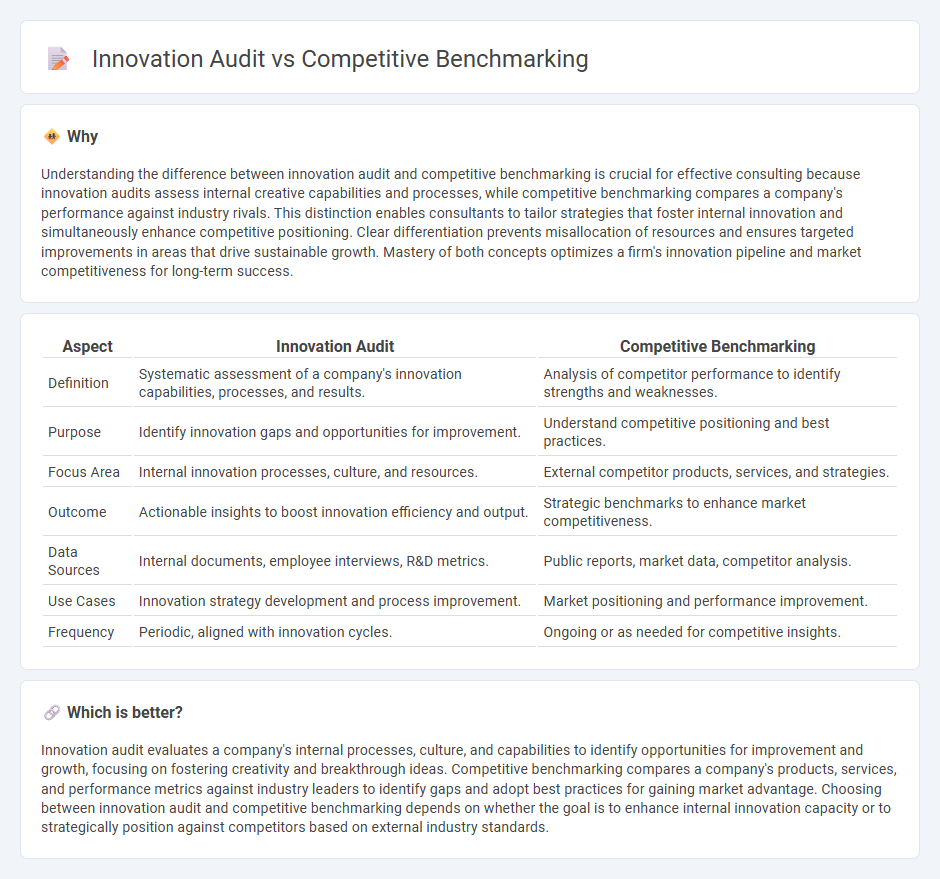
Innovation audits evaluate a company's internal processes, culture, and capabilities to identify opportunities for breakthrough improvements and drive sustainable growth. Competitive benchmarking compares an organization's products, services, and performance metrics against industry rivals to uncover market positioning gaps and strategic advantages. Explore how innovation audits and competitive benchmarking can transform your business strategy.
Why it is important
Understanding the difference between innovation audit and competitive benchmarking is crucial for effective consulting because innovation audits assess internal creative capabilities and processes, while competitive benchmarking compares a company's performance against industry rivals. This distinction enables consultants to tailor strategies that foster internal innovation and simultaneously enhance competitive positioning. Clear differentiation prevents misallocation of resources and ensures targeted improvements in areas that drive sustainable growth. Mastery of both concepts optimizes a firm's innovation pipeline and market competitiveness for long-term success.
Comparison Table
| Aspect | Innovation Audit | Competitive Benchmarking |
|---|---|---|
| Definition | Systematic assessment of a company's innovation capabilities, processes, and results. | Analysis of competitor performance to identify strengths and weaknesses. |
| Purpose | Identify innovation gaps and opportunities for improvement. | Understand competitive positioning and best practices. |
| Focus Area | Internal innovation processes, culture, and resources. | External competitor products, services, and strategies. |
| Outcome | Actionable insights to boost innovation efficiency and output. | Strategic benchmarks to enhance market competitiveness. |
| Data Sources | Internal documents, employee interviews, R&D metrics. | Public reports, market data, competitor analysis. |
| Use Cases | Innovation strategy development and process improvement. | Market positioning and performance improvement. |
| Frequency | Periodic, aligned with innovation cycles. | Ongoing or as needed for competitive insights. |
Which is better?
Innovation audit evaluates a company's internal processes, culture, and capabilities to identify opportunities for improvement and growth, focusing on fostering creativity and breakthrough ideas. Competitive benchmarking compares a company's products, services, and performance metrics against industry leaders to identify gaps and adopt best practices for gaining market advantage. Choosing between innovation audit and competitive benchmarking depends on whether the goal is to enhance internal innovation capacity or to strategically position against competitors based on external industry standards.
Connection
Innovation audit evaluates a company's current innovation capabilities and processes, identifying strengths and weaknesses to enhance product development and market responsiveness. Competitive benchmarking compares these innovation metrics against industry leaders to reveal gaps and opportunities for improvement. This connection enables organizations to strategically align their innovation efforts with market best practices, driving sustainable competitive advantage.
Key Terms
Performance Metrics
Competitive benchmarking examines performance metrics by comparing key indicators such as productivity, cost efficiency, and customer satisfaction against industry leaders to identify gaps and opportunities for improvement. Innovation audits assess these metrics with an emphasis on innovation capabilities, measuring factors like idea generation rates, time-to-market, and R&D effectiveness to evaluate how well a company fosters and implements new ideas. Explore in-depth analyses to understand how each approach can optimize your organization's performance and innovation outcomes.
Industry Best Practices
Competitive benchmarking evaluates a company's performance against industry best practices by analyzing competitors' strategies, processes, and outcomes to identify areas for improvement. Innovation audits assess an organization's capacity for creativity and new product development, focusing on internal processes, resources, and culture that drive innovation. Explore how integrating competitive benchmarking with innovation audits can enhance your organization's strategic positioning and growth potential.
Ideation Processes
Competitive benchmarking evaluates ideation processes by comparing a company's innovation strategies, idea generation techniques, and creative output against industry leaders to identify performance gaps and best practices. Innovation audits assess the effectiveness and efficiency of internal ideation frameworks, including the quality of idea pipelines, employee engagement in innovation, and the alignment of creative initiatives with strategic goals. Explore deeper insights on enhancing ideation effectiveness through targeted benchmarking and comprehensive innovation audits.
Source and External Links
Guide to Competitive Benchmarking: Overview, Steps & FAQs - Competitive benchmarking is comparing your business, product, or service to competitors to assess strengths, weaknesses, and market opportunities, enabling informed strategic decisions and adaptation to market trends.
What Is Competitive Benchmarking? | Indeed.com - Competitive benchmarking involves comparing company metrics against competitors' data to contextualize performance, motivate improvements, and identify business opportunities for better goal setting.
Competitive Benchmarking in 2025: Best Practice Guide - This practice supports continuous improvement by enabling businesses to regularly measure and adjust their performance against competitors, thereby maintaining competitiveness and driving growth through data-driven decisions.
 dowidth.com
dowidth.com